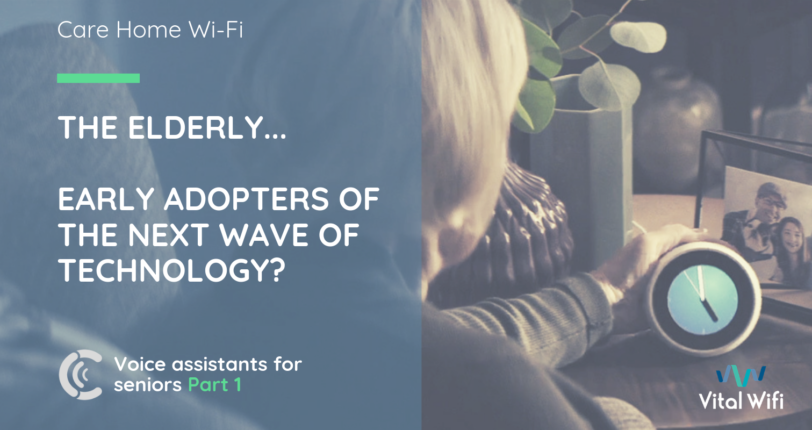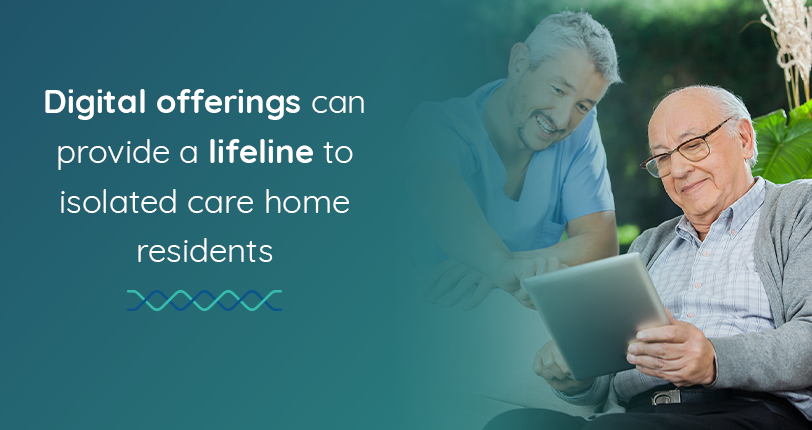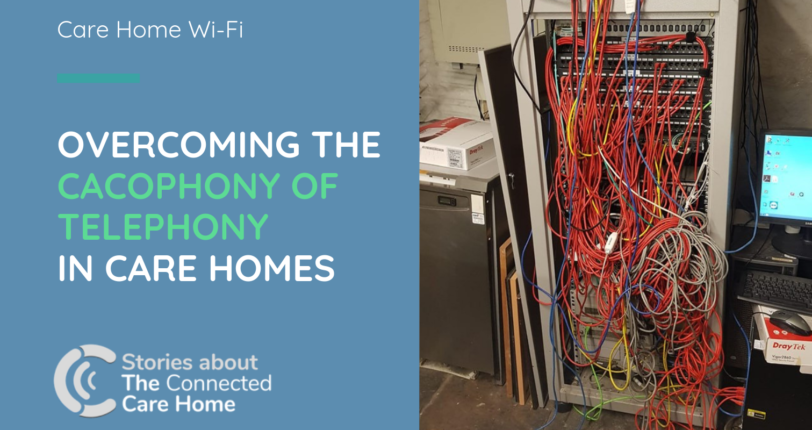“Seniors don’t get along with new technology.” This has always been the conventional wisdom. But the next wave of tech is designed to be so easy and intuitive that seniors are likely to find it hugely helpful in combating the daily challenges that erode their independence. Voice-first is a new wave of technology that’s set to be a life-changer for both residents (literally in some cases) and staff in care homes.
But do care homes in the UK have the necessary infrastructure to offer what is becoming a widespread new phenomenon: a care home WiFi network capable of supporting in-room voice assistants such as Amazon’s Alexa or Google Home?
If “Tech” today is about solving problems, extending our abilities and simplifying our daily lives to enhance our living, then nowhere is this more relevant than for the immobile and isolated elderly. Particularly in the UK with carer and funding shortages.
The internet has revolutionised our way of living but, until recently, to access the innovations you had to do so via a desktop browser and keyboard and navigate your way around the computer. Then developers became driven by ‘mobile-first’ as smartphones become the de-facto access point. But for older people, these devices are more of a barrier than an enabler.
Voice First is the New Mobile First
Now a new trend has emerged where developers are making their applications work with ‘voice-first’. Using developments in NLP (Neuro-Linguistic Programming), voice-first solutions are controlled by speaking – a very natural and friction-less interface with immediate applications for care home residents, caregivers and solution-providers.
Voice-first applications typically run on a care home WiFi network. With the ubiquity of WiFi in most buildings, this allows voice assistant devices to be deployed in every room for every resident. Currently, these are mostly in the form of speaker-based devices like the Amazon Echo, but new wearable and mobile applications will likely soon become commonplace.
But, How Good is Your Care Home WiFi?
With the availability of affordable and reliable care home WiFi networks like SeniorConnect, there is little reason why these cannot be introduced immediately into care homes. Even if they only adopt off-the-shelf consumer devices, they will improve the lives of residents immediately.
Seniors Can Work with Voice Assistants
In its study, The Future of Voice First Technology and Older Adults, Aging in Place explains why voice-first technology is a game-changer for older adults.
Typically, as technology change accelerates, older people tend to miss out the report says. When users adopt a technology late on, the benefits can elude them as they encounter the next disruptive wave. This is mapped out by Gartner’s Hype Cycle where hype often turns to disappointment:
The report reflects that rapid change in technology can overwhelm seniors and lead to social isolation. With smartphones, for example, older adults are challenged by the cost of upgrading, so get stuck with older versions. Software and Apps need updating or can become obsolete. Security threats spawn fear and mistrust and yet more updates.
So, Why is the Adoption of Voice Technology for Care Homes Different?
Why are retirement homes inspired to run trials and pilots? Ageing in Place’s report cites these reasons:
- Ease of use – no downloads and upgrades needed
- Cheap – devices are inexpensive
- Useful – just answering simple questions is highly valuable
- Smart and Connected – features like home automation ‘just work’
Arguably it’s self-evident that if a device can respond to voice commands in an intuitive way, and does so successfully, then older users will delight in using them.
Evidence-Based: Alexa Trials for Carers
Pilot studies are taking place in pockets across the UK, such as with Innovate Trust, Hampshire County Council and Oxfordshire Country Council with Amazon’s Alexa, and follows successful trials in the US such as that by Front Porch.
The Front Porch Center for Innovation and Wellbeing (FPCIW) piloted the Amazon Echo and Dot in one of its senior living communities in 2017, resulting in game-changing results:
- 75% used their smart devices at least once a day
- 100% felt the Alexa overall made their life easier
- 71.43% felt more connected to family, friends, and the community since the start of the pilot
In Atlanta, Thrive Senior Living, is deploying smart assistants in all its independent living, assisted living and memory care communities in 2019. It is using Aiva Health, an innovative new startup.
Thrive says: “Aiva uses Google Home, Amazon Echo and smart speakers to not only engage and empower Thrive residents but also to connect them more closely to their caregivers.
The voice operating system (OS) is built on a suite of enterprise applications – a mobile app for caregivers to manage help requests, a dashboard for performance reporting and a backend for controlling the voice assistants’ settings and interactions with other IoT smart devices such as TVs, lights and thermostats.
When residents interact with the devices, they can speak with caregivers directly via simple mobile apps, and caregivers can respond in their voices, routing specific requests to team members best-suited to fulfil them. The devices are also used for daily information such as checking the weather, knowledge searches and music, as well as informing residents about social events in the community, dining menus and calendar notifications.”
UK Pilots Pave the Way
In the UK, The Accenture Liquid Studio in London ran a pilot program using artificial intelligence (AI) and the ease of voice to help older people manage the daunting challenges of navigating their care delivery and well-being. The platform learns user behaviours and preferences and suggests activities to support the overall physical and mental health of individuals aged 70 and older.
Their pilot has a ‘Family and Carer’ portal that lets caregivers check on the individual’s daily activities, such as whether they have taken their medication or made new requests for caregivers. The Accenture platform can also spot abnormalities in behaviour and alert carers, based on programmed criteria.
In another trial, Innovate Trust, which has 94 supported living schemes across the three council areas, believes ten schemes using an intelligent virtual assistant could initially make annual savings of £248,000.
In care homes today, voice assistants can solve simple problems like ‘what’s for lunch today’ or ‘what time is it’, which are in themselves life-changing features. But they can also be life-saving when a resident has a fall and can’t reach for the emergency alert button and instead calls out for help to the voice assistant.
Where is Technology Heading?
To see where this is leading, look at what hospitals are beginning to do with voice assistants. They are reviewing how Alexa or similar voice assistants, can be a part of the medical team, “monitoring doctor-patient interactions, suggesting treatment approaches, or even alerting caregivers to voice changes that could be an early warning of a health emergency,” reports the BBC.
So, technology is finally doing what it’s supposed to: aiding our lives in a seamless, frictionless way. Care homes can be forgiven for passing by many new technology ‘fads’ but the ‘voice-first’ approach; it seems, is a no-brainer.
The question, though, we have for care homes is this:
Can your WiFi handle it?
NOTE: while Voice Assistants do not require linking to a smartphone they do mostly need a robust WiFi network. Care homes interested in upgrading their system can apply for a free site survey and report from Vital WiFi, a specialist in deployment and management of WiFi in care homes.
SeniorConnect is a managed WiFi system that requires little or no upfront investment and can be funded from the operational expenditure.
To apply for a free WiFi Site Survey & Assessment Report contact Vital WiFi on:
e: seniorconnect@vitalWiFi.com
t: 0333 3583111
w: https://comms.vitalWiFi.com/request-survey
SOURCES:
1 https://www.technologyreview.com/s/608047/the-octogenarians-who-love-amazons-alexa/
2 https://www.ageinplacetech.com/page/future-voice-first-technology-and-older-adults-2018
5 https://www.statnews.com/2019/02/06/voice-assistants-at-bedside-patient-care/
6 https://www.bbc.co.uk/news/uk-wales-south-east-wales-42029859






